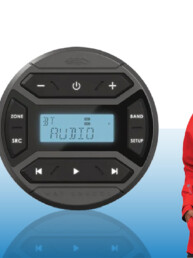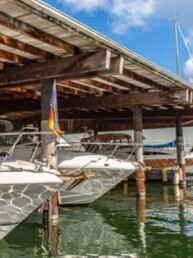A Public Service Announcement From Your Friendly Neighborhood Marine Diesel Mechanic
Ring ring, ring ring! “Meredith, we need you! When can you come? Why can’t you come sooner? You’re booked out? But we are ready for our trip! Our friends are here and we want to leave tomorrow! Help!”
It’s that special time of year when the all-nighters, emergency calls, and insane demand for mechanics reaches a fever pitch. The high season for boating is here and, despite being busy through the winter, the urgency and workload is multiplied many times over by emergencies happening with folks getting underway for the first time in months. To some mechanics, this may be the best time of year, but for others, it’s the most difficult.
In this hectic sunny season, I’m grateful for my current and regular clients—the ones who don’t usually contribute to the drama because they have done their due diligence and maintained their engines properly throughout the year. But for many others who were less proactive or are having some bad engine luck, anything that means they can’t go cruising right now becomes a five-alarm super-crisis.
A good friend of mine—a sailor and retired diesel mechanic—once told me to “not make everyone else’s emergency into my emergency.” He is right, yet I have struggled with this concept since day one of running my own business—perhaps out of fear that I would lose business or upset someone for not being able to fix their boat right away. I love what I do, and I love having the opportunity to help everyone I can. However, the stress of trying to be there for every mishap can take its toll when I no longer have any free days, when I work through the night finishing projects, and when I can’t keep things straight because I am beyond busy. This is a reality for a lot of marine professionals—the cobbler’s kids always have the worst shoes, right?
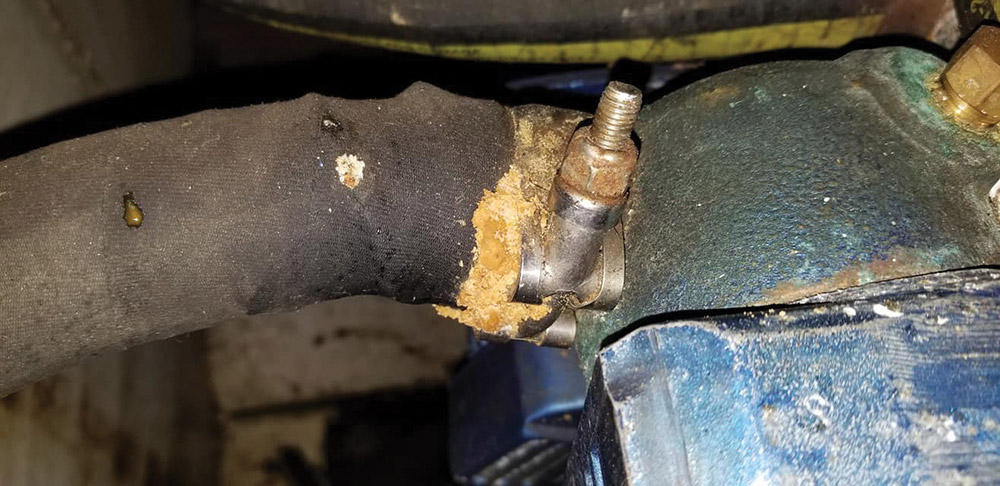
In all seriousness, so many things can happen while you’re on the water. And I know this not only as a professional, but also as a fellow cruiser. You have to expect the unexpected, even when relying on well-cared-for diesels. Random stuff happens on boats, and I have personally encountered issues while cruising—my starter broke in half one year and a main battery fuse blew another year. Thankfully it was nothing serious enough to stall my trip or put me in harm’s way. These challenges weren’t debilitating partly because I was prepared for the season long before the boat was ever untied from the dock, and that’s something any cruiser can do.

Last year, I repowered my boat with a good used engine. I planned and saved money for that project for over a year, knowing I wanted to have it done during the winter. I actually skipped my typical summer’s end cruising trip that year, partly because I knew the old engine was tired and wanted to avoid the risk of getting stranded, and partly to work and save more toward that big investment.
Two years before, I had all of my aging rigging and sails replaced, some of which I discovered weren’t even installed correctly. Planning ahead of time allowed me to not only budget for these expensive repairs, but to actually be able to get on someone’s calendar.
It seems trouble is often on the docket for those who push their luck with an existing system issue (like an engine) and then it fails at the worst time. Cruising anywhere away from home can put folks in a vulnerable situation when it comes to repairs—usually having to get towed into a random marina, with unknown yards and techs. Lots of cruisers can share positive experiences under these trying circumstances, but there are also those who have encountered professionals who are poised to take full advantage of your unfortunate plight.
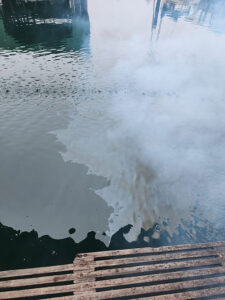
I have been writing these engine articles for a few years hoping to share some knowledge and information with this community and help you understand the world of engines and the recreational marine industry. Hopefully you’ve heard about a spirit of proactivity with regard to maintenance and engine care, because my experience has shown that the more urgent and dire your moment of need, the more the service industry can feel like the wild west.
With this in mind, I’d encourage any cruiser to brush up on some of my articles (they’re all online at 48North.com) about preparing yourself and your engine by performing preventative maintenance, carrying spare parts, and understanding some of your engine’s systems on a basic level to help you diagnose issues while underway.
The examples are infinite, but here are a few good practices. Make sure you have spare fuses on-board, plan checkpoints along your itinerary where you can order parts from the dealer in case something breaks, and make sure the larger components of your cooling system and fuel systems are good to go during the offseason when things are slower and the boat doesn’t need to go anywhere. Carry spare fuel filters and other basic parts onboard so if something does happen, you are not waiting around in an expensive guest slip somewhere hoping there is a mechanic nearby. Things like this can absolutely save the trip and your wallet when it comes to the usual issues we all have while cruising.
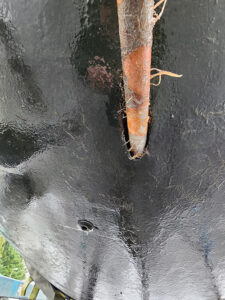
Let me assure you, nobody wants to address big issues underway. Changing out a badly corroded heat exchanger tube stack, replacing rotting motor mounts or ancient hoses, or rebuilding injectors during your cruise to the San Juan Islands should never even cross your mind. That should’ve been done long before you left on a trip, and if you know it needs to be done, I encourage patience to get the job done right prior to casting off.
Most folks are extremely diligent and do a good job of keeping systems happy. I am proud of a lot of my clients and students who have gone above and beyond to make sure their engines are in the best shape they can be for cruising season, which entails thoughtful normal maintenance and pre-planned projects. These are the folks who avoid the worst of the high season panic and eleventh-hour emergency phone calls. None of us can prevent random failures completely, but each of us can try our best to be prepared for what could happen.
When something does go awry, one of the hardest parts can be coming up with a plan—can you anchor and make a repair yourself, or do you need to get towed in and wait for help ashore? Have you taken some classes about engines or electrical systems to build a foundation of self-sufficiency to work through the problem? As long as you are safe and the boat is safe, a good compromise can be to call a knowledgeable person who could help you work through a problem remotely. And if you do have to hire unknown help, avoid desperation and impatience as much as possible, and try not to make big decisions under duress—that’s the most common path to regret.
Having a solid game plan in place is key to having a successful cruise, and that means considering and planning for certain worst case scenarios. And then trust your preparation. Most of the emergency calls I get during the summer are completely avoidable, so your diligence is likely to be rewarded with a great experience. Take care of your boats and take care of yourselves, and enjoy summer cruising. I hope to see you out on the water; hopefully without a wrench in my hand!
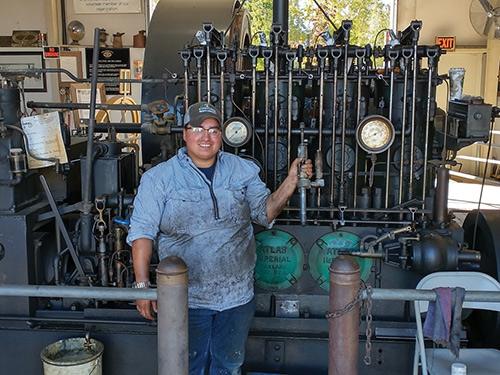
her own boat.
Meredith Anderson is the owner of Madame Diesel, LLC, where she operates a mobile mechanic service and teaches hands-on marine diesel classes to groups and in private classes aboard clients’ own vessels.


